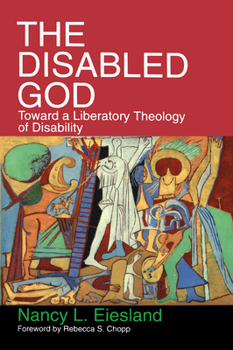The Disabled God: Toward a Liberatory Theology of Disability
Select Format
Select Condition 
Book Overview
Draws on themes of the disability-rights movement to identify people with disabilities as members of a socially disadvantaged minority group rather than as individuals who need to adjust. Highlights... This description may be from another edition of this product.
Format:Paperback
Language:English
ISBN:0687108012
ISBN13:9780687108015
Release Date:September 1994
Publisher:Abingdon Press
Length:140 Pages
Weight:0.56 lbs.
Dimensions:0.4" x 6.1" x 9.2"
Customer Reviews
3 ratings
It's about time
Published by Thriftbooks.com User , 16 years ago
Isn't God a white-haired, able-bodied male? As so many myths have been exploded since liberation theology entered our consciousness, perhaps handicapism is the final frontier (probably not.) In 1980 I became temporarily handicapped due to a car accident and it opened my eyes and spirit to disability. In the last few years I have become handicapped in ways sometimes invisible, but increasingly more visible. (Nancy Eiesland spends some time discussing the vocabulary of this "condition." I'm using words I'm comfortable with; just as she used the words she's comfortable. Like everything else there is no unanimity of style. The book is described as a master's thesis or having been derived from her master's thesis. It shows. That's both good and bad news. It exercised my brain cells - always a good thing even for folks who aren't handicapped. In addition to reach an audience including church leaders, she needed to give us the theological justification for what she is proposing. Agree with her theology or not, you have to take seriously adding handicapism under the umbrella of liberation theology. She couldn't have fulfilled this purpose without writing it from an academic point of view. She used the experience of two other authors who happen to be handicapped to increase the variety of handicap experiences. I read Nancy Mairs', Waist High to the World several years ago and enjoyed it enormously, but Nancy Eiesland is coming at handicapism not only from the point of view of lived experience, but also asking, "What does it mean to me as a person of faith to be handicapped? Can I be a disciple with a broken body? How should church leaders use the gifts of our brothers and sisters to enrich and challenge our churchs/synagogues/ mosques?" I, or we as a people are, inately nosy and I could have gotten to her point and the issues she raised sooner if she had described her disability near the beginning of the book just so I could put her story in context. It doesn't make any difference to her work or point of view, but... I have only read the beginning of the book so far and all I know about her is that she uses a wheelchair and has braces. It sounds as though this situation has been ungoing since childhood. Eiesland has barely opened the door on theological reflection on handicapism. I look forward to the next authors who will take us further.
A Great Read
Published by Thriftbooks.com User , 16 years ago
This is one of the best books on theology and the disabled that I have ever read. As a student preparing for the ordained ministry I would recommend this book to all seminarians and pastors. It is time that the church rethink it's response to the disabled. Nancy Eisland does this wonderfully when she reminds us of the wounds of Christ.
Awesome and Life Changing
Published by Thriftbooks.com User , 22 years ago
I was assigned to read this text for a course. It was one of the most life changing reads of my entire life. I have recommended the book to family and friends and I will continue to do so. It was a liberating read which caused me to evaluate my own thoughts towards those that are able bodied and those that are not. My concept of what is whole and what is not has also been affected. And although I do not live with a handicap the book gave me insight that I could have never imagined.Thank you Nancy Eisland for a marvelous work.






